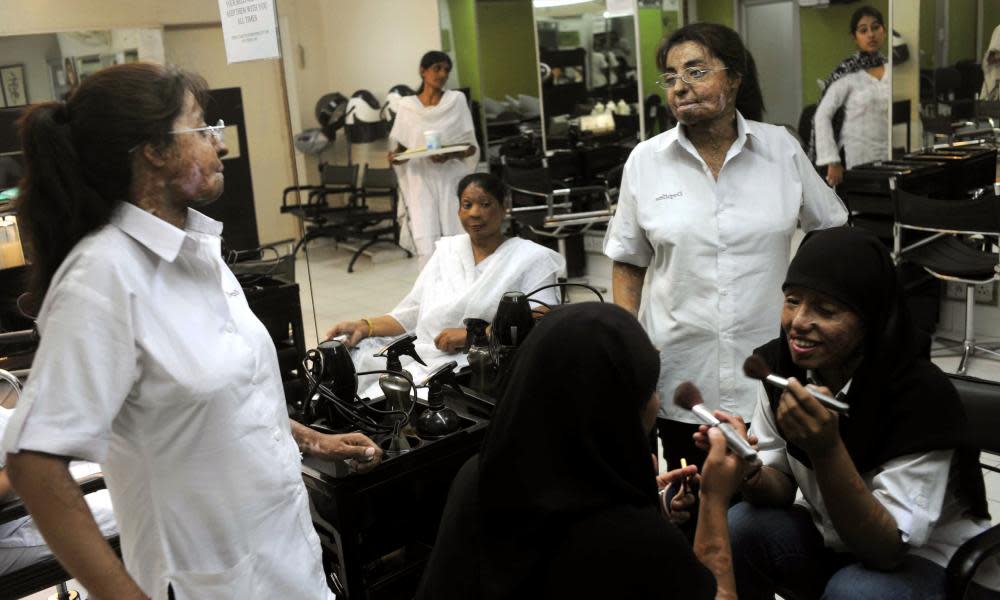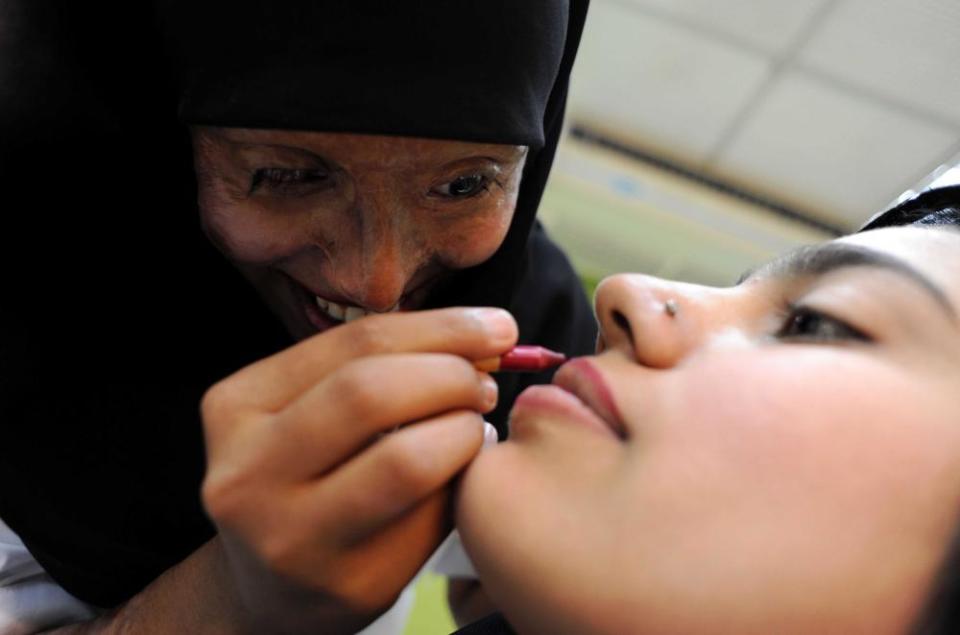'Now I'm independent': the Pakistan beauty salons employing acid attack survivors

Margaret Heera runs her fingers through her customer’s hair. “You must manage time for yourself and your skin,” she says, as she ties the hair into an elaborate knot.
The beauty salon in Lahore is busy. Sitting between potted plants on chairs facing full-length mirrors, women are waiting to get their hair cut or styled, for manicures and pedicures.
The salon is a place of sanctuary for women in the city. But for Heera, 29, it’s much more.
One day in 2013, Heera’s husband of two years locked her in a room and poured acid over her face and body. He was unhappy about the small dowry she’d received from her parents when they had married.
Every year many women in Pakistan are attacked with acid, despite legislation aimed at preventing such attacks.
Heera is one of seven women currently working in the Depilex salon as part of a jobs scheme for acid attack survivors who are often shunned , overlooked for jobs and treated as outcasts.
“At first, most of the clients were shocked when they saw me, my scars … they wouldn’t allow me to work for them, but now it’s all good. Everyone is very supportive,” says Heera. “Now, I am independent. I am investing in my son’s education.”
At first, most of the clients were shocked when they saw me, my scars … but now it’s all good
Margaret Heera
Launched in 1980 by businesswoman Masarrat Misbah, the salon chain has spread across the country. In 2005, Misbah set up the Depilex Smileagain Foundation to support burn victims, particularly survivors of acid attacks, with reconstructive surgery, counselling, vocational training, and jobs in her salons.
Abdiya Shaheen, Smileagain’s programme manager, said that out of 750 women registered with the foundation, 460 are survivors of acid attacks.
Most acid attackers are men, and the majority of victims are women. The attacks often happen because women are perceived to be shunning gender traditions, by refusing a marriage proposal for example. Women have also been attacked with acid for giving birth to girls.
Legislation introduced in Pakistan in 2011 saw offenders face between 14 years and life imprisonment, as well as a fine of 1 million rupees (£4,700).
According to data collected by NGO the Acid Survivors Foundation (ASF), between 2007 and 2018 there were 1,485 reported cases of acid attacks in Pakistan. About a third involved children splashed with acid when family members were attacked.

Last year, 80 acid attacks were reported, a 50% drop since 2014. But while the fall in cases is seen by some as evidence that the legislation is effective, others believe many more incidents go unreported.
Conviction rates of offenders are not encouraging, and dropped by almost half between 2016 and 2018 – from 63.6% to 38.4%.
In Punjab province, where more than 80% of Pakistan’s acid attacks are reported, authorities do claim to be taking the law seriously.
One reason for the high number of cases is the difficulty in controlling the sale of acid, used for farming cotton, a key industry in Punjab. Cotton products account for 10% of the country’s GDP.
Related: 'He thought he'd ruin me': Indian acid attack survivor and model speaks out | Ruchi Kumar
In 2012, the state authorities ruled that acid attacks would be prosecuted in courts that were originally established to try terror suspects. The state says using these special courts both speeds up the legal process and sends a strong message about the importance the government places on ending acid attacks.
The approach seems to be working. According to ASF, which also works with police and lawyers, only 2–3% of acid attacks were reported in Punjab before the law changed. Now, more than 90% of cases are reported.
Last year, Punjab’s chief minister, Usman Buzdar, committed 100 million rupees to helping survivors of acid and burn attacks undergo rehabilitation and come “back to life”. The money is expected to provide support to 1,000 survivors.
Zainab Qaiserani, project coordinator at ASF, says the authorities still need to do more.
“We are currently advocating for a bill on a provincial and federal level to ensure free provision of medical and rehabilitation services to acid attack and burn victims, along with developing a monitoring and funding mechanism,” she says.
The process is not that fast. Especially with the advent of Covid-19
Zainab Qaiserani
“The process is not that fast. Especially with the advent of Covid-19, the immediate priorities of the government have shifted to respond to the pandemic and the issues arising from it.”
Sabra Sultana, manager of the Depilex salon in Jhelum, was attacked with acid in 1993 by her husband in a dowry dispute. She took the case to court, but her husband accused her of being mentally unstable, and he walked free.
Sultana, who began training as a beautician in 2006, says she now lives life on her own terms and supports other survivors.
“So many lives [have been] torn apart, but we are fighting this now,” she says. “It’s never too late.”

 Yahoo News
Yahoo News 
